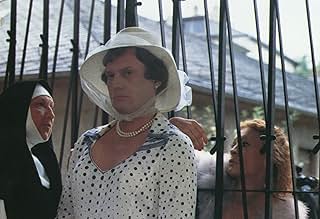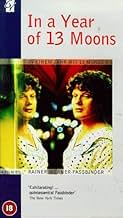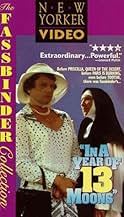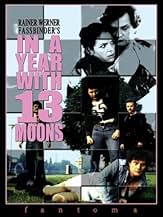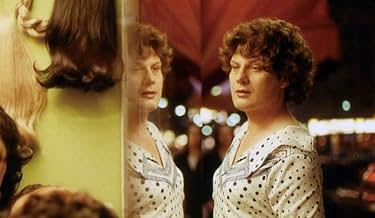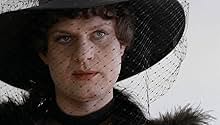IMDb-BEWERTUNG
7,3/10
5051
IHRE BEWERTUNG
Eine transgender Frau versucht, etwas aus der Trümmerliebe zu retten, indem sie sich ihrer qualvollen Vergangenheit stellt und hofft, die ultimative Akzeptanz bei Quondambekannten und sich s... Alles lesenEine transgender Frau versucht, etwas aus der Trümmerliebe zu retten, indem sie sich ihrer qualvollen Vergangenheit stellt und hofft, die ultimative Akzeptanz bei Quondambekannten und sich selbst zu finden.Eine transgender Frau versucht, etwas aus der Trümmerliebe zu retten, indem sie sich ihrer qualvollen Vergangenheit stellt und hofft, die ultimative Akzeptanz bei Quondambekannten und sich selbst zu finden.
- Regie
- Drehbuch
- Hauptbesetzung
- Auszeichnungen
- 1 wins total
Lilo Pempeit
- Schwester Gudrun
- (as Lieselotte Pempeit)
Janez Bermez
- Oskar Pleitgen
- (Nicht genannt)
Rainer Werner Fassbinder
- Self
- (Archivfilmmaterial)
- (Nicht genannt)
Günther Holzapfel
- Angestellter H. H. Brei
- (Nicht genannt)
Ursula Lillig
- Putzfrau
- (Nicht genannt)
Augusto Pinochet
- Self
- (Archivfilmmaterial)
- (Nicht genannt)
Empfohlene Bewertungen
Many, if not all of Fassbinder's films focus on weighty, emotional issues and characters plunged into personal despair, but none more so than the torturous and overpowering melodrama of In a Year of 13 Moons (1978). Here, Fassbinder created a film that is completely miserable in both tone and content from the first frame until the last; with the director taking the personal loss over the suicide of his lover Armin Meier and turning it into a suffocating chamber piece of pain and humiliation. Like his earlier masterpiece, Fox and his Friends (1975), the film focuses on the personal exploitation and persecution of a sensitive character at the hands of the people that he loves, as he finds himself cast against a cruel backdrop of the grimy and oppressive homosexual sub-culture of 1970's Frankfurt. However, unlike Fox and his Friends, the spirit of Meier's death and the guilt that we assume Fassbinder was suffering from at the time of the film's conception have here removed any prevailing notion of hope or the promise of escape that hung-over the character of Franz - the lottery winning carnival worker from the aforementioned "Fox", as he sought an end to his cruel suffering - and replaced it with a continually degrading emphasis on shame and deprivation.
Fassbinder establishes the pitiless tone of the film right from the start, with an opening vignette showing our central character, dowdy transsexual Elvira Weishaupt, dressed as a man and wandering through a park in the early hours of the morning looking for trade. After successfully managing to hook-up with a suitably butch male-prostitute, her secret is soon discovered and the 'john', alongside a couple of similarly macho friends, beat and mock Elvira, leaving her as a shivering, crying wreck, half-naked on an disused train-track. From here, Elvira limps home to her cramped apartment only to be plunged into a torturous, violent argument with her ex-boyfriend, which again, leaves her used and humiliated. The film continues in this episodic approach as we follow Elvira over the course of a few days and eventually find out more about her true character and personality and the events in her life that led to the eventual creation of the person that she is when we first discover her. These events are no less cruel and humiliating to the character of Elvira - who has clearly made a number of mistakes, either as a result of naiveté, arrogance or blind stupidity - as we discover the process that turned a handsome young man with a wife and infant daughter into an overweight, alcoholic wreck, abused and betrayed by the various men in her life, and the social pariahs that hang on the periphery.
As ever with Fassbinder, the presentation of the film underpins the feelings of the character and the world that she inhabits perfectly; with the cramped spaces of her apartment made even more prison-like and oppressive by the director's claustrophobic use of staging, design and composition. Fassbinder undertook the role of cinematographer himself here and shot the film on grainy 16mm, which again, adds to the stark and colourless feeling that the film conveys. The ugliness of the cinematography, with its dimly lit rooms, fragment composition and awkward camera movements could be seen as either amateurish on the part of the filmmaker, or as a deliberate attempt to distance the viewer from the characters and the emotional subtext in a manner that is reminiscent of Brecht; or, more appropriately, Godard's cinematic appropriation of Brecht and his theatre of alienation. As with the subsequent political satire, The Third Generation (1979) - once again, shot by Fassbinder himself - the unconventional approach to cinematography is combined with further elements that attempt to similarly disarm us and make the process of viewing the film as difficult as possible. The opening scene itself is emblematic of this approach, with Fassbinder obscuring the frame with large titles and an opening text that scrolls slowly over the entire frame before continuing with his use of obscured images and fragmented mise-en-scene.
Fassbinder also uses jarring cuts, with scenes seemingly beginning during the middle of a conversation or after the context of the scene has already been established, whilst sound and the disorientating way in which the director has characters talking over one another while music plays disconcertingly in the background all continue this idea of deconstruction and emotional distraction. The ugliness of the film fits perfectly with its tone; with the legendary scene in which Elvira and her friend wander ghost-like through an actual slaughterhouse, where cows are dispatched in graphic detail, whilst a monologue is recited to give us the entire back-story of this truly tragic figure. Whether or not Elvira is an extension of Fassbinder or the personification of Armin Meier is unknown, though there is certainly that element to the interpretation. I'd imagine that there is also some of the director in the portrayal of manipulative antagonist Anton Saitz, who recalls the depiction of Fassbinder in the director's own segment of Germany in Autumn (1978). Regardless, In a Year of 13 Moons is a fascinating if entirely difficult work from Fassbinder; one that brims with an uncomfortable feeling of personal confession and searing self examination that is grotesque, repellent and utterly draining, whilst also standing as a powerful and passionately realised piece of work that is both remarkable and affecting.
Fassbinder establishes the pitiless tone of the film right from the start, with an opening vignette showing our central character, dowdy transsexual Elvira Weishaupt, dressed as a man and wandering through a park in the early hours of the morning looking for trade. After successfully managing to hook-up with a suitably butch male-prostitute, her secret is soon discovered and the 'john', alongside a couple of similarly macho friends, beat and mock Elvira, leaving her as a shivering, crying wreck, half-naked on an disused train-track. From here, Elvira limps home to her cramped apartment only to be plunged into a torturous, violent argument with her ex-boyfriend, which again, leaves her used and humiliated. The film continues in this episodic approach as we follow Elvira over the course of a few days and eventually find out more about her true character and personality and the events in her life that led to the eventual creation of the person that she is when we first discover her. These events are no less cruel and humiliating to the character of Elvira - who has clearly made a number of mistakes, either as a result of naiveté, arrogance or blind stupidity - as we discover the process that turned a handsome young man with a wife and infant daughter into an overweight, alcoholic wreck, abused and betrayed by the various men in her life, and the social pariahs that hang on the periphery.
As ever with Fassbinder, the presentation of the film underpins the feelings of the character and the world that she inhabits perfectly; with the cramped spaces of her apartment made even more prison-like and oppressive by the director's claustrophobic use of staging, design and composition. Fassbinder undertook the role of cinematographer himself here and shot the film on grainy 16mm, which again, adds to the stark and colourless feeling that the film conveys. The ugliness of the cinematography, with its dimly lit rooms, fragment composition and awkward camera movements could be seen as either amateurish on the part of the filmmaker, or as a deliberate attempt to distance the viewer from the characters and the emotional subtext in a manner that is reminiscent of Brecht; or, more appropriately, Godard's cinematic appropriation of Brecht and his theatre of alienation. As with the subsequent political satire, The Third Generation (1979) - once again, shot by Fassbinder himself - the unconventional approach to cinematography is combined with further elements that attempt to similarly disarm us and make the process of viewing the film as difficult as possible. The opening scene itself is emblematic of this approach, with Fassbinder obscuring the frame with large titles and an opening text that scrolls slowly over the entire frame before continuing with his use of obscured images and fragmented mise-en-scene.
Fassbinder also uses jarring cuts, with scenes seemingly beginning during the middle of a conversation or after the context of the scene has already been established, whilst sound and the disorientating way in which the director has characters talking over one another while music plays disconcertingly in the background all continue this idea of deconstruction and emotional distraction. The ugliness of the film fits perfectly with its tone; with the legendary scene in which Elvira and her friend wander ghost-like through an actual slaughterhouse, where cows are dispatched in graphic detail, whilst a monologue is recited to give us the entire back-story of this truly tragic figure. Whether or not Elvira is an extension of Fassbinder or the personification of Armin Meier is unknown, though there is certainly that element to the interpretation. I'd imagine that there is also some of the director in the portrayal of manipulative antagonist Anton Saitz, who recalls the depiction of Fassbinder in the director's own segment of Germany in Autumn (1978). Regardless, In a Year of 13 Moons is a fascinating if entirely difficult work from Fassbinder; one that brims with an uncomfortable feeling of personal confession and searing self examination that is grotesque, repellent and utterly draining, whilst also standing as a powerful and passionately realised piece of work that is both remarkable and affecting.
"In a Year of 13 Moons" is a harrowing and brutal film that explores the themes of identity, human suffering and despair. Fassbinder's films, for the most part, are penetrating glimpses into the human condition at its most vulnerable. I really adore Ingmar Bergman's films, but they are considered "too pessimistic or depressing" for some, but my goodness, Rainer Werner Fassbinder's are bleak as night, often set in an unforgiving, cold and unreceptive world.
The film follows Elvira Weishaupt (Volker Spengler), a troubled and struggling transgender woman, who is wrestling with her identity. Fassbinder would construct the film through a non-linear narrative, that intertwines her many painful memories, her personal encounters, and the many philosophical thoughts and reflections on her life. Considered by many to be one of Fassbinder's most challenging and deeply personal films, and for good reason too. Fassbinder would make "In a Year of 13 Moons" in response to the suicide of his close lover, and this grief added to the intense and turbulent atmosphere that the film carries. The themes of rejection and despair are strong themes that drive the film, along with the search for love, and the pain and devastation of its absence. One of my favorite directors, Richard Linklater, would regard it as his favorite Fassbinder film. It is claustrophobic and very depressing, but for people who enjoy character driven dramas, then you may appreciate it.
The film follows Elvira Weishaupt (Volker Spengler), a troubled and struggling transgender woman, who is wrestling with her identity. Fassbinder would construct the film through a non-linear narrative, that intertwines her many painful memories, her personal encounters, and the many philosophical thoughts and reflections on her life. Considered by many to be one of Fassbinder's most challenging and deeply personal films, and for good reason too. Fassbinder would make "In a Year of 13 Moons" in response to the suicide of his close lover, and this grief added to the intense and turbulent atmosphere that the film carries. The themes of rejection and despair are strong themes that drive the film, along with the search for love, and the pain and devastation of its absence. One of my favorite directors, Richard Linklater, would regard it as his favorite Fassbinder film. It is claustrophobic and very depressing, but for people who enjoy character driven dramas, then you may appreciate it.
The story the idea of this movie, is amazing. It really does showcases how somebody that went through extreme child trauma being isolated, lonely, sad, wanted love from a male figure, and that was not possible from the one he-she wanted. It really is a fascinating story.
However, i have a huge problem with this movie and that's the pacing. I can assure you that 40 minutes or so could of been removed from this movie, and we'd have a better paced movie.
Minus the pacing, everything here works. The acting is alright, the camera work is okay, the story is alright. Everything here works. Minus the pacing.
The cow slaughtering scene was completely out of left field. Yes yes, our main character our star, worked as a butcher. But the problem with that is, this whole movie is a tragic, depressing drama. And out of no where, we just get cow murder exploitation? Why??? It really did not have to be in this movie at all! We had a tragic drama, and we added cow murder for no reason! It's so out of field, it pulls you out of the story completely, and it felt like i was watching FACES of DEATH again. Ludacris.
Another problem i got is, the suicide scene of that man. It has nothing to do with the story it's just added there so the movie gets longer and padded. This entire movie could of been better if stuff that have nothing to do with the movie aren't here. Also the prologned television scene, it took them ages for that to finish.
Ultimately yes i enjoyed this movie, but at the same time it is a chore to get through it really is. Also i think i have to rewatch this probably 2 - 3 time to actually get all the details. There's many details in this that are really hard to follow.
I mean if you are into drama misery films like JACOB's LADDER, you'll probably enjoy this.
However, i have a huge problem with this movie and that's the pacing. I can assure you that 40 minutes or so could of been removed from this movie, and we'd have a better paced movie.
Minus the pacing, everything here works. The acting is alright, the camera work is okay, the story is alright. Everything here works. Minus the pacing.
The cow slaughtering scene was completely out of left field. Yes yes, our main character our star, worked as a butcher. But the problem with that is, this whole movie is a tragic, depressing drama. And out of no where, we just get cow murder exploitation? Why??? It really did not have to be in this movie at all! We had a tragic drama, and we added cow murder for no reason! It's so out of field, it pulls you out of the story completely, and it felt like i was watching FACES of DEATH again. Ludacris.
Another problem i got is, the suicide scene of that man. It has nothing to do with the story it's just added there so the movie gets longer and padded. This entire movie could of been better if stuff that have nothing to do with the movie aren't here. Also the prologned television scene, it took them ages for that to finish.
Ultimately yes i enjoyed this movie, but at the same time it is a chore to get through it really is. Also i think i have to rewatch this probably 2 - 3 time to actually get all the details. There's many details in this that are really hard to follow.
I mean if you are into drama misery films like JACOB's LADDER, you'll probably enjoy this.
As some others have written or implied this film is absolutely exhausting. It doesn't abandon its character or his life at any time although at times we almost WANT relief. Mahler's music in films has been dutifully noted. It can be almost as depressing in concert version. As for Nino Rota's "happy" music, or "life just continues (joyfully)" score, the irony isn't lost either. This is a one-man job and therefore takes risks that few producers or companies would tolerate under normal circumstances. I was profoundly moved by the film; I just don't plan to see it again for a while.
Curtis Stotlar
Curtis Stotlar
This drama follows the last few days in the life of Elvira (formerly Erwin) Weisshaupt. Years before, Erwin told a co-worker, Anton, that he loved him. "Too bad, you aren't a woman," he replied. Erwin took Anton at his word. Trying to salvage something from the wreckage love has made of his life, he now hopes that Anton will not reject him again.
At this point (2017), I have seen most of what Fassbinder has made. And, indeed, the vast majority is really good. Some have said this is his best work. While I am not sure I am ready to jump on that train, I am also not willing to deny the possibility. Even the content alone deserves praise. This is 1978. I am no expert on transgender history, but I cannot think of any films that tackled such a heavy subject this far back.
If anything, the film seems even more topical today as transgender issues are more front and center. The mainstream is ready to stand up for the rights of these folks, and films like "13 Moons" should really be re-examined by the film community.
At this point (2017), I have seen most of what Fassbinder has made. And, indeed, the vast majority is really good. Some have said this is his best work. While I am not sure I am ready to jump on that train, I am also not willing to deny the possibility. Even the content alone deserves praise. This is 1978. I am no expert on transgender history, but I cannot think of any films that tackled such a heavy subject this far back.
If anything, the film seems even more topical today as transgender issues are more front and center. The mainstream is ready to stand up for the rights of these folks, and films like "13 Moons" should really be re-examined by the film community.
Wusstest du schon
- WissenswertesThe tape-recorded narration heard throughout the film (particularly during the final scene) was not scripted. Volker Spengler (playing Elvira Weishaupt) and Rainer Werner Fassbinder recorded the narration together, with Fassbinder asking questions and Spengler responding in character. In the final cut of the film, Fassbinder's voice is edited out.
- SoundtracksSchöner fremder Mann
Music and Words by Athena Hosey and Hal Gordon and German lyrics by Camillo Felgen
Performed by Connie Francis
Top-Auswahl
Melde dich zum Bewerten an und greife auf die Watchlist für personalisierte Empfehlungen zu.
- How long is In a Year with 13 Moons?Powered by Alexa
Details
- Erscheinungsdatum
- Herkunftsland
- Sprache
- Auch bekannt als
- In a Year with 13 Moons
- Drehorte
- Produktionsfirmen
- Weitere beteiligte Unternehmen bei IMDbPro anzeigen
Box Office
- Budget
- 700.000 DM (geschätzt)
- Laufzeit
- 2 Std. 4 Min.(124 min)
- Sound-Mix
- Seitenverhältnis
- 1.66 : 1
Zu dieser Seite beitragen
Bearbeitung vorschlagen oder fehlenden Inhalt hinzufügen

